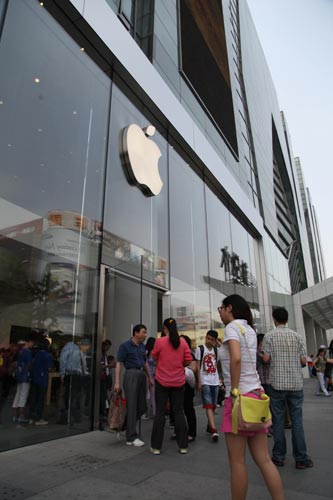Apple courts local developers for larger market share
By Tuo Yannan and Gao Yuan (China Daily) Updated: 2012-06-14 09:15
|
 |
|
An Apple Inc store in Beijing's Xidan shopping district. The company will open two more stores in China, according to recent media reports. [Photo/China Daily] |
Apple Inc is embracing Chinese developers in a bid to increase its market share in China.
AutoNavi's navigation application showed up on Apple's latest operating system on Tuesday, replacing the Google map application.
The change follows reports that Apple will replace the Google search engine on its iPhones with Baidu Inc's.
"AutoNavi's Apple map team was established two years ago. The team now has more than 100 employees," Yang Yongqi, vice-president of AutoNavi Holdings Ltd, said on his micro blog.
After Apple's new CEO Tim Cook took over, he made many moves to strengthen Apple's presence in China. He visited the country and met with high-level government officials in March. His predecessor, Steve Jobs, never visited the country.
Recent reports said that Apple will open two more stores in China, leading analysts to believe that the company will place greater emphasis on the world's biggest smartphone market.
Map applications are one of the most popular application categories in the App Store.
"Based on Apple's huge customer base, Apple is very likely to become an important map provider once the next generation iPhone and iPad models arrive on the market," said Yan Xiaojia, an analyst at Analysys International.
Yan added that the market size for Apple map applications is estimated to be more than 100 million customers.
Apple is also developing its own map application, Yan said.
AutoNavi said its free mobile map application had 52 million users and more than 29 million monthly active users at the end of the first quarter, compared with a total of 40 million users and more than 20 million monthly active users in the last fiscal year.
"AutoNavi's mobile phone navigation service was the top mobile phone-based navigation system in China, with nearly 39 percent of the market in the first quarter," said Yin Xinglong, also an analyst at Analysys International.
In China, 284 million people use mobile Internet maps to navigate. AutoNavi map and technology applications lead the market with a 25.9 percent share, while Google's share in the sector was only 16.7 percent in the first quarter, according to Analysys International.
According to recent Chinese media reports, Google services will be replaced by Chinese search engine provider Baidu's on Apple's iPhones, which may further reduce Google's role in China's search engine market.
Baidu accounted for about 35 percent of total searches on mobile devices last year, followed by Easou.com with 21 percent, and Tencent Holdings Ltd's Soso.com at 20 percent.
Google only held 11.1 percent, according to Analysys International.
The possible deal between Baidu and Apple "was aimed more at gaining publicity than boosting Baidu's share in the mobile market, because iPhone users are a minority among Chinese mobile phone users", said Li Zhi, a senior analyst with the research company, in an earlier interview with China Daily.
AutoNavi was listed on the NASDAQ Global Select Market in July 2010. In May, it reported $26.9 million in gross profit in the first quarter, a year-on-year increase of 49.6 percent.
Automotive navigation was AutoNavi's most profitable sector. It generated more than $35 million in net revenue in the first quarter.
But the company's mobile and Internet location-based businesses delivered $9.9 million in net revenue over the same period.
"The increases were primarily because of the growth in revenues derived from the pre-installation of the company's navigation solutions on mobile phones," AutoNavi said in its financial report.
Contact the writers at tuoyannan@chinadaily.com.cn and gaoyuan@chinadaily.com.cn
Chen Limin contributed to this story.

- China toughens ID registration on phone use
- China's foreign trade drops 7.3% in first seven months
- Sany turns to Russia for more construction deals
- ING Group bets big on China's trade initiatives
- PBOC vows continuity, stability in monetary policy
- China to regulate online equity financing platforms
- Chinese firm donates medical equipment to Zambia
- JD.com buys 10% stake in Yonghui Superstores for 4.3 billion yuan

















